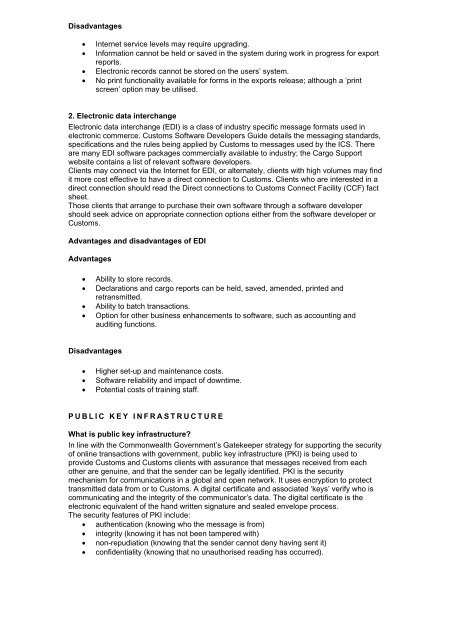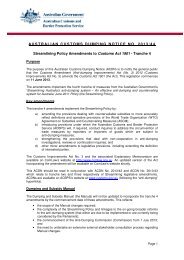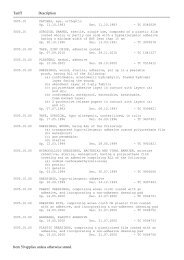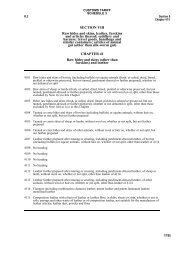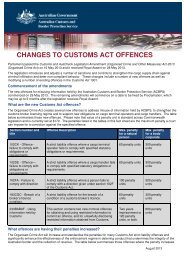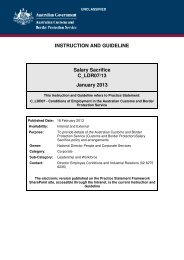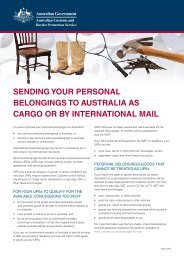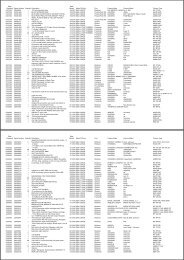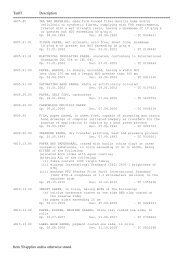SELF ASSESSED CLEARANCE DECLARATIONS - Australian ...
SELF ASSESSED CLEARANCE DECLARATIONS - Australian ...
SELF ASSESSED CLEARANCE DECLARATIONS - Australian ...
You also want an ePaper? Increase the reach of your titles
YUMPU automatically turns print PDFs into web optimized ePapers that Google loves.
Disadvantages<br />
• Internet service levels may require upgrading.<br />
• Information cannot be held or saved in the system during work in progress for export<br />
reports.<br />
• Electronic records cannot be stored on the users’ system.<br />
• No print functionality available for forms in the exports release; although a ‘print<br />
screen’ option may be utilised.<br />
2. Electronic data interchange<br />
Electronic data interchange (EDI) is a class of industry specific message formats used in<br />
electronic commerce. Customs Software Developers Guide details the messaging standards,<br />
specifications and the rules being applied by Customs to messages used by the ICS. There<br />
are many EDI software packages commercially available to industry; the Cargo Support<br />
website contains a list of relevant software developers.<br />
Clients may connect via the Internet for EDI, or alternately, clients with high volumes may find<br />
it more cost effective to have a direct connection to Customs. Clients who are interested in a<br />
direct connection should read the Direct connections to Customs Connect Facility (CCF) fact<br />
sheet.<br />
Those clients that arrange to purchase their own software through a software developer<br />
should seek advice on appropriate connection options either from the software developer or<br />
Customs.<br />
Advantages and disadvantages of EDI<br />
Advantages<br />
• Ability to store records.<br />
• Declarations and cargo reports can be held, saved, amended, printed and<br />
retransmitted.<br />
• Ability to batch transactions.<br />
• Option for other business enhancements to software, such as accounting and<br />
auditing functions.<br />
Disadvantages<br />
• Higher set-up and maintenance costs.<br />
• Software reliability and impact of downtime.<br />
• Potential costs of training staff.<br />
PUBLIC KEY INFRASTRUCTURE<br />
What is public key infrastructure?<br />
In line with the Commonwealth Government’s Gatekeeper strategy for supporting the security<br />
of online transactions with government, public key infrastructure (PKI) is being used to<br />
provide Customs and Customs clients with assurance that messages received from each<br />
other are genuine, and that the sender can be legally identified. PKI is the security<br />
mechanism for communications in a global and open network. It uses encryption to protect<br />
transmitted data from or to Customs. A digital certificate and associated ‘keys’ verify who is<br />
communicating and the integrity of the communicator’s data. The digital certificate is the<br />
electronic equivalent of the hand written signature and sealed envelope process.<br />
The security features of PKI include:<br />
• authentication (knowing who the message is from)<br />
• integrity (knowing it has not been tampered with)<br />
• non-repudiation (knowing that the sender cannot deny having sent it)<br />
• confidentiality (knowing that no unauthorised reading has occurred).


